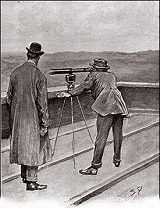“Because I could tell them what they are dying to know; but nothing would induce me to help the rascals in any way.”
I had been casting round for some excuse by which I could get away from his gossip, but now I began to wish to hear more of it. I had seen enough of the contrary nature of the old sinner to understand that any strong sign of interest would be the surest way to stop his confidences.
“Some poaching case, no doubt?” said I with an indifferent manner.
“Ha, ha, my boy, a very much more important matter than that! What about the convict on the moor?”
I started. “You don’t mean that you know where he is?” said I.
“I may not know exactly where he is, but I am quite sure that I could help the police to lay their hands on him. Has it never struck you that the way to catch that man was to find out where he got his food and so trace it to him?”
He certainly seemed to be getting uncomfortably near the truth. “No doubt,” said I; “but how do you know that he is anywhere upon the moor?”
“I know it because I have seen with my own eyes the messenger who takes him his food.”
My heart sank for Barrymore. It was a serious thing to be in the power of this spiteful old busybody. But his next remark took a weight from my mind.
“You’ll be surprised to hear that his food is taken to him by a child. I see him every day through my telescope upon the roof. He passes along the same path at the same hour, and to whom should he be going except to the convict?”
Here was luck indeed! And yet I suppressed all appearance of interest. A child! Barrymore had said that our unknown was supplied by a boy. It was on his track, and not upon the convict’s, that Frankland had stumbled. If I could get his knowledge it might save me a long and weary hunt. But incredulity and indifference were evidently my strongest cards.
“I should say that it was much more likely that it was the son of one of the moorland shepherds taking out his father’s dinner.”
The least appearance of opposition struck fire out of the old autocrat. His eyes looked malignantly at me, and his gray whiskers bristled like those of an angry cat.
“Indeed, sir!” said he, pointing out over the wide-stretching moor. “Do you see that Black Tor over yonder? Well, do you see the low hill beyond with the thornbush upon it? It is the stoniest part of the whole moor. Is that a place where a shepherd would be likely to take his station? Your suggestion, sir, is a most absurd one.”
I meekly answered that I had spoken without knowing all the facts. My submission pleased him and led him to further confidences.
“You may be sure, sir, that I have very good grounds before I come to an opinion. I have seen the boy again and again with his bundle. Every day, and sometimes twice a day, I have been able - but wait a moment, Dr. Watson. Do my eyes deceive me, or is there at the present moment something moving upon that hillside?”
It was several miles off, but I could distinctly see a small dark dot against the dull green and gray.
“Come, sir, come!” cried Frankland, rushing upstairs. “You will see with your own eyes and judge for yourself.”
The telescope, a formidable instrument mounted upon a tripod, stood upon the flat leads of the house. Frankland clapped his eye to it and gave a cry of satisfaction.

“Quick, Dr. Watson, quick, before he passes over the hill!”
There he was, sure enough, a small urchin with a little bundle upon his shoulder, toiling slowly up the hill. When he reached the crest I saw the ragged uncouth figure outlined for an instant against the cold blue sky. He looked round him with a furtive and stealthy air, as one who dreads pursuit. Then he vanished over the hill.
“Well! Am I right?”